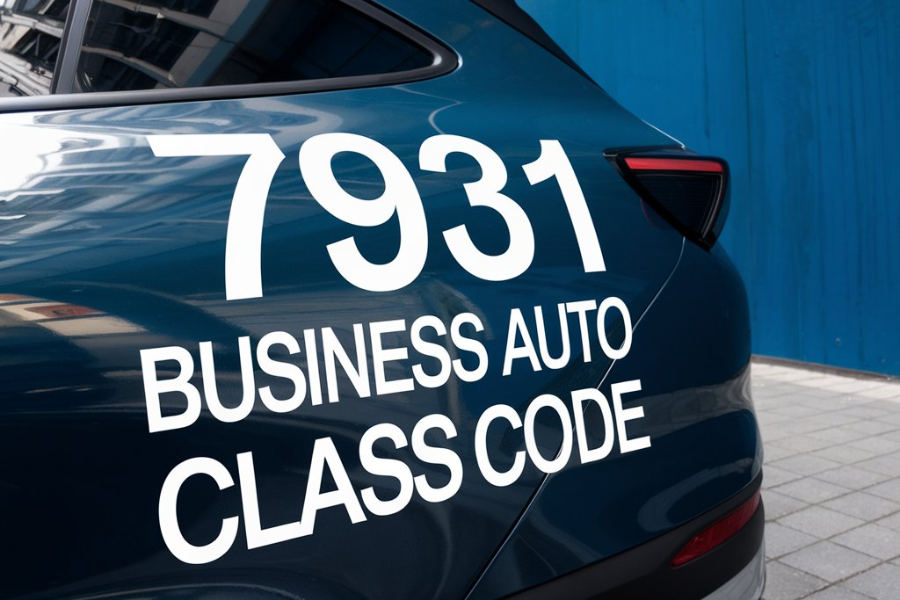In today’s fast-paced business world, companies that rely on vehicles for daily operations face a unique set of challenges, particularly when it comes to insurance. One critical element that can impact a company’s bottom line is understanding the 7931 business auto class code. This code is essential for insurance classification, directly influencing premiums and coverage. If your business is experiencing high auto insurance costs, you may not be properly classified. Understanding the nuances of this code can help you find the best business auto insurance for your needs, ultimately saving money while ensuring that your business is well-protected.
Struggling with high premiums and unclear insurance terms? It might be time to reevaluate your business auto class code. This guide explores the significance of the 7931 code, how it affects your premiums, and what businesses qualify for this classification. We will also cover strategies to save on insurance and common misconceptions that many business owners have about the 7931 code.
What Is The 7931 Business Auto Class Code?
The 7931 business auto class code is designed for companies in the transportation sector, but it has a broader reach than many business owners realize. Essentially, this classification is used by insurance companies to assess the risk associated with businesses that operate vehicles. Businesses that fall under this code are typically involved in transporting goods or passengers, but it can also include companies that lease commercial vehicles for occasional use.
For businesses that qualify under this classification, understanding how the 7931 code impacts insurance premiums is key to managing costs effectively. Being correctly classified under this code can help you secure lower premiums, but failure to do so could result in higher costs or insufficient coverage, leaving your business exposed in the event of an accident or claim.
How The 7931 Business Auto Class Code Affects Insurance Premiums?
The 7931 business auto class code is more than just a number—it plays a direct role in how insurers assess the risk associated with your business and calculate your premiums. When a business is classified under the 7931 code, it signals that the company is involved in some form of transportation, which is generally considered a higher-risk category. Higher risk often translates to higher premiums, as insurers see companies that operate vehicles as more likely to be involved in accidents or incidents that could lead to a claim.
However, this doesn’t mean that high premiums are inevitable. Understanding the specific factors that insurers consider when classifying a business under the 7931 code can help you take proactive steps to reduce your costs. For example, improving driver safety, implementing fleet management systems, or ensuring that vehicles are regularly maintained can lower the perceived risk and lead to more favorable insurance rates.
Who Qualifies For The 7931 Business Auto Class Code?

Businesses that qualify for the 7931 code are those that either own or lease commercial vehicles and are involved in the transportation of goods or people. This includes a wide range of industries, from delivery services and freight companies to ride-sharing services and courier businesses. Even if transportation is not your company’s primary focus, you could still fall under this classification if you use vehicles for business purposes.
For example, a small delivery business that occasionally transports goods or a local shuttle service that moves people between destinations could both be subject to the 7931 classification. Even companies that use vehicles for sporadic business purposes, such as making client visits or attending off-site events, may fall under this code. Properly classifying your business vehicles is essential to avoid unnecessary insurance costs and to ensure you have adequate coverage for any potential risks.
The Importance Of Correctly Classifying Business Vehicles
Misclassifying your business vehicles can lead to a number of problems, including higher insurance premiums and rejected claims. If your vehicles are placed in the wrong class code, your insurer might see your business as a higher risk than it actually is, leading to inflated premiums. Worse yet, if you file a claim and your vehicles are misclassified, there’s a chance that your claim could be denied, leaving your business vulnerable to financial losses.
By correctly identifying your vehicles under the 7931 business auto class code, you ensure that your insurance policy accurately reflects your risk profile. This helps to not only lower your premiums but also gives you peace of mind, knowing that your business is properly covered in the event of an accident or claim. Proper classification ensures that your business operates within the framework of the law while enjoying the best possible insurance rates.
How To Save On Insurance With The Right Auto Class Code?
Saving on business auto insurance starts with proper classification under the correct class code. By ensuring that your business is attributed to the 7931 code, you open the door to a range of risk mitigation strategies that can lower your premiums over time. Many businesses unknowingly overpay for insurance because they fail to accurately classify their vehicles and operational exposures.
To further reduce your insurance costs, consider investing in risk management solutions, such as driver safety programs, regular vehicle maintenance, and fleet management systems. Insurers are more likely to offer lower rates to businesses that demonstrate proactive efforts to minimize risk. For example, equipping your vehicles with tracking systems and implementing strict safety protocols can significantly lower your business’s risk profile, which can result in long-term savings on insurance.
Common Misconceptions About The 7931 Business Auto Class Code

There are several misconceptions surrounding the 7931 business auto class code, which can lead to confusion and misclassification. One common misconception is that this code only applies to large transportation companies. In reality, any business that uses vehicles for commercial purposes—even occasionally—could fall under this classification. This includes small businesses, such as delivery services, ride-sharing apps, or companies that use vehicles for client visits.
Another misconception is that businesses can classify their vehicles under any code to receive lower premiums. However, misclassification can lead to higher costs in the long run and potentially denied claims. It’s essential to fully understand how the 7931 code applies to your business and to work with your insurance provider to ensure that you are correctly classified.
Examples Of Businesses Covered By The 7931 Business Auto Class Code
- Auto Repair Shops
Businesses that provide auto repair and maintenance services are typically classified under the 7931 Business Auto Class Code. These shops handle various tasks, such as engine diagnostics, brake repairs, and general vehicle servicing. The nature of their work involves risks related to working with heavy machinery, hazardous materials, and the potential for accidents, making proper insurance coverage essential to protect both employees and customers. - Car Dealerships
Car dealerships, which sell vehicles and often provide additional services like test drives and repairs, also fall under the 7931 classification. These businesses face unique risks due to the handling of high-value vehicles, customer interactions during test drives, and the storage of inventory. The classification ensures that car dealerships have insurance coverage tailored to their specific operational risks, safeguarding them against potential liabilities.
- Auto Body Shops
Auto body shops, specializing in vehicle repairs after accidents, are another business category covered by the 7931 Business Auto Class Code. These shops focus on collision repair, repainting, and restoring vehicles to their original condition. Given the complexity and risk involved in dealing with damaged vehicles, proper classification under the 7931 code ensures these businesses are adequately insured for the challenges they face in their day-to-day operations. - Towing Services
Towing companies that provide roadside assistance and vehicle recovery services are also included under the 7931 Business Auto Class Code. The nature of towing operations, which often involves hazardous roadside conditions and the transportation of disabled vehicles, makes these businesses particularly susceptible to risks. Proper classification ensures that towing services have the necessary insurance coverage to protect their workers, vehicles, and customers in high-risk situations.
FAQs
1. What Exactly Is The 7931 Business Auto Class Code?
The 7931 business auto class code is a specific insurance classification for businesses primarily involved in transportation. It helps insurance companies assess the risk associated with the business and impacts the auto insurance rates these businesses will pay.
2. How Does Being Classified Under The 7931 Code Influence My Insurance Premiums?
Being classified under the 7931 code means your business is considered to have higher transportation-related risks. As a result, insurers may charge higher premiums. However, understanding this code can help you better manage and reduce those premiums.
3. Can Small Businesses Qualify For The 7931 Business Auto Class Code?
Yes, small businesses that use vehicles for transporting goods or people, such as delivery services or rideshare companies, may fall under the 7931 class code. It’s not limited to large companies; even occasional vehicle use for business purposes can lead to this classification.
4. Will Changing My Business’s Class Code Lower My Auto Insurance Premiums?
Yes, if your business has been misclassified under a higher-risk code, adjusting to the correct classification can lead to lower premiums. Ensuring your business is under the proper code helps align your rates with the actual level of risk.
5. Why Is It Critical To Classify Business Vehicles Under The Correct Auto Class Code?
Accurate classification of your business vehicles ensures you have the right insurance coverage. Misclassification can result in higher premiums or even denied claims, leaving your business vulnerable in case of an accident or damage.
Conclusion
In conclusion, understanding the 7931 business auto class code is vital for businesses that rely on vehicles for their operations. This classification can have a significant impact on your insurance premiums, so it’s important to ensure your business is properly categorized. By doing so, you not only align your coverage with the actual risk associated with your business but also position yourself to potentially lower your insurance costs. Staying informed about this code can be a key factor in maintaining both financial efficiency and operational security.
Proper classification doesn’t just help you save money—it also ensures you have the right protection in place when you need it most. Incorrect classification could lead to denied claims in the event of an accident or unforeseen incident, leaving your business vulnerable to financial loss. By regularly reviewing your insurance policies and working with your insurer to confirm that your vehicles are placed under the correct code, you can safeguard your business against these risks.
Ultimately, the 7931 business auto class code is more than just a number on a policy; it’s a crucial tool for managing your business’s risk and insurance expenses. As your business grows or changes, make it a priority to revisit this classification to ensure it still reflects your operations. By doing so, you’ll be better positioned to optimize your coverage, control costs, and protect your company’s long-term interests.


